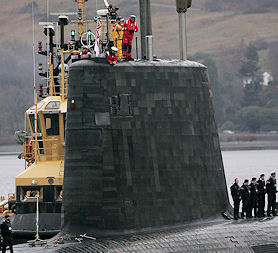Government denies plan to delay Trident decision
The government denies plans to delay a decision on a replacement for the Trident nuclear deterrent, as a Channel 4 News FactCheck finds there would be extra costs involved if it were to do so.

After media reports of a delay and angry scenes in the Commons, the Armed Forces Minister Nick Harvey told MPs this was not being considered.
He said: “There is no suggestion that I’m aware of either delaying any decision or indeed delaying the procurement …. the key decisions and the timetable are already decided and nothing has changed that in any sense.”
The former defence secretary Bob Ainsworth was suspicious, telling the House that “somebody high up in the government is casting the bread on the water and is thinking about delaying the replacement in the way that is being reported”.
And the former Conservative defence spokesman Julian Lewis said Defence Secretary Liam Fox could not continue to do his job if the reports were correct.
He said he would be “amazed” if Dr Fox remained as defence secretary because a delay would be “in defiance of all the pledges given to the electorate and given to Conservative MPs by our leadership when we were asked to join the coalition”.
Election pledge
The Conservatives fought the last election on a pledge to replace Trident. Their Liberal Democrat coalition partners were opposed, but have agreed to support the Conservatives’ plans in government.
As part of the government’s comprehensive spending review, the Ministry of Defence (MoD) is facing cuts of 10-20 per cent in its annual £37bn budget.
The Treasury has made it clear that the £20bn cost of Trident will have to be borne by the MoD, as the department carries out its strategic defence and security review.
Ministers have been working to a timetable that assumes a final decision on a replacement would be made by 2014.
‘Delay considered’
But sections of the media, including Channel 4 News, were told this week that ministers were considering a delay to save money in the short term.
Costs of delay
Analysis by Channel 4 News FactCheck has found that a delay would mean higher costs in the long term.
The Trident Vanguard class submarines were designed to last 25 years. The December 2006 defence white paper, the Future of the United Kingdom's Nuclear Deterrent, said it would be possible to extend their working lives by another five years.
This is the timetable the MoD is working to at the moment, but a further extension would be problematic.The white paper said: "Any further extension of the life of the submarines would mean that the key components .... would need to be replaced or refurbished, and this would require a major refit of the submarines. This would not extend the lives of the submarines much further and would not therefore be cost effective."
In its report on the white paper published in March 2007, the all-party defence select committee said it had been given costings by senior MoD civil servant Tom McKane.
"He stated that 'the work that we have done shows that we are probably talking in round terms of hundreds of millions for the five years for the four boats'. Mr McKane told us that with life extension beyond 30 years 'you then start talking in terms of billions'."
Read more